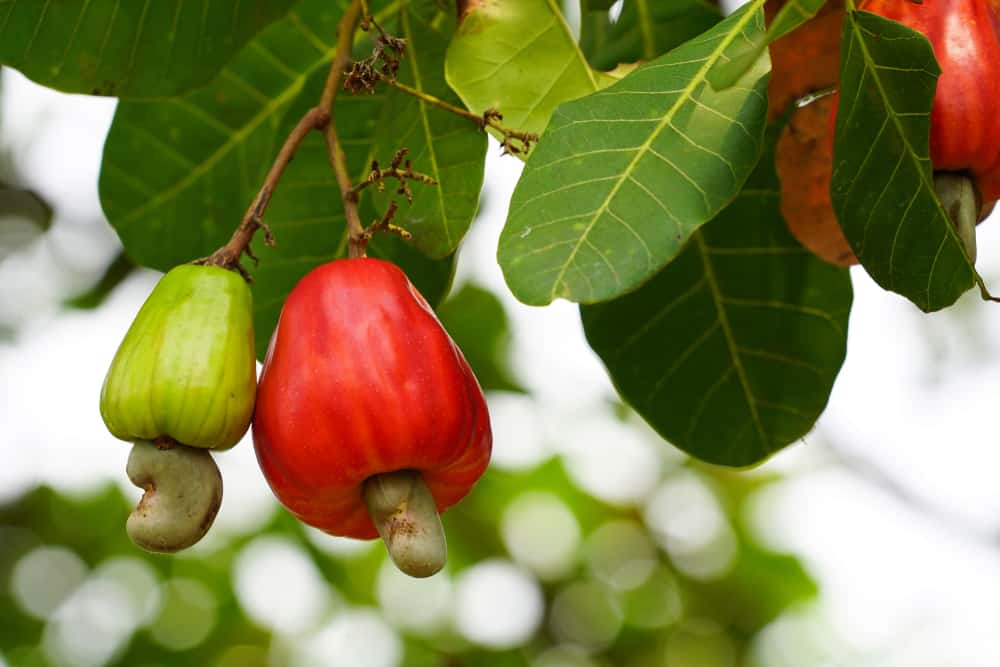ENJOY Free U.S. Shipping on Orders $59+. Shipping not available to Canada, Mexico & non-contiguous U.S. Dismiss

Eating nuts and seeds by the handful can conjure up all sorts of fond memories: of eating peanuts at a fair, or of chewing through sunflower seed shells at a baseball game. The enjoyment of nuts and seeds seems to go hand in hand with doing a little work for your food. But, this is not the case with the versatile and delicious jumbo cashew. You may be a cashew lover yourself but have never given thought to how you don’t ever see cashews sold in their shells like so many other nuts. Why is this?
Today we’re breaking down the cashew nut and giving you everything you ever wanted to know about how cashews are grown and harvested.
Delicious, satisfying, and creamy in texture, raw cashew nuts are a healthy snack enjoyed all over the world. But where are these delicious treats grown?
The cashew nut’s plant was originally found in Brazil, and transported to India and South East Asia as it became commercialized. Once people realized that this once exotic tree could grow in many tropical climates, they’ve made their way over to West Africa as well.
When cashew trees grow, they can get up to 45 feet tall! When they produce fruit, theirs is known as an accessory fruit, or false fruit. This is because the apple-like fruit that grows from cashew trees isn’t the harvest you want, but rather the kidney bean-shaped drupe that hangs below the cashew apple is the real prize. What might seem even crazier is that there is only one cashew per cashew apple! That means every cashew you eat came from an individual fruit. Inside this drupe, attached to the cashew apple is what will become the beloved cashew nut.
Covering this cashew nut, is in fact, a shell! But, if cashew nuts are grown in shells, why can’t we purchase them like we can peanuts or pistachios?
To understand how and why jumbo cashews are harvested and sold the way that they are, you need to understand this important tidbit about them: they come from the same family of plants as poison ivy. Cashew plants contain a toxic substance called urushiol in the plants’ leaves. This substance is also found in between the nut and the shell, making shelling these nuts a highly skilled and sometimes hazardous process. This is why it would be a terrible idea (not to mention very illegal) to ship cashews to consumers in their shells.
In order to shell the jumbo cashew nut, the harvesters (typically women) typically have to crack the nut open with their hands, which can expose their hands to the urushiol. This exposure to urushiol can pose several health hazards to the people shelling cashews. The biggest concern is that when urushiol hits the skin, it can cause irritation, itchiness, and even a burn at the site. Because of these concerns about toxin exposure, Beyond the Nut has taken measures to prevent toxic exposure of any kind for any of its employees. Beyond the Nut’s cashews are grown, harvested, and processed in a safe and sustainable way that honors the environment and the labor of growing this delicious nut.
Because of the cashew nut’s exposure to this toxin, all cashews are treated by steaming or lightly roasting in order to rid the nut of this toxin. Cashews are then safe to make their way to your homes, and to your mouths! So, technically even the “raw” cashews you purchase have been lightly cooked in order to make them safe to eat.
Because Beyond the Nut wants you to love cashews as much as we do, we hold ourselves to the highest of Fair Trade standards. This means that we take the proper precautions with the harvesting process to protect our workforce from any toxic exposure when harvesting cashews. We also train our employees to manually and mechanically process cashews in a way that is environmentally friendly and results in the cleanest, purest-tasting cashews.
So whether you enjoy creating homemade cashew butter with raw cashews, or eating roasted jumbo cashews by the handful, you’ll enjoy them even more knowing the crazy process these nuts have to go through in order to make it to your door.
Fuel Your Beyond with the Latest Discounts, Promotions, and Product Announcements